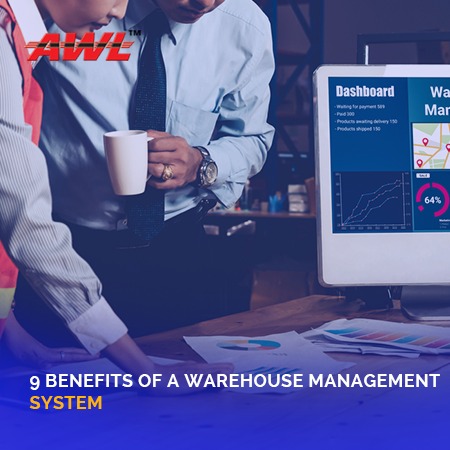

A WMS enables businesses to track inventory levels in real-time, which can help prevent stockouts and overstocking. Additionally, businesses can use the data collected by the WMS to identify trends and make informed decisions about inventory levels. This can help businesses reduce inventory carrying costs and increase profitability. One of the main benefits of a WMS is improved inventory management. Another benefit of a WMS is increased efficiency in warehouse operations. A WMS can help businesses automate many warehouse processes, such as counting inventory, generating reports, and processing orders. By reducing the time and effort required for manual tasks, businesses can improve their overall efficiency and productivity.
A WMS can also help businesses enhance their order fulfilment process. With a WMS, businesses can pick and pack orders more efficiently, reducing the time it takes to get orders out the door. Additionally, businesses can use the data collected by the WMS to improve the accuracy of their order fulfilment process, reducing the number of errors and improving customer satisfaction. In this blog post, we will discuss what is a warehouse management system along with the nine benefits of using a warehouse management system.
Warehouse management systems (WMS) are computerised systems that help businesses manage their inventory and operations more efficiently. With the help of WMS, businesses can optimise warehouse processes, track inventory, improve order fulfilment, and more. Moreover, warehouse management systems or WMS are software applications that enable businesses to manage their inventory and operations more efficiently. A WMS can help businesses automate many warehouse processes, including receiving, putaway, picking, packing, and shipping. By streamlining these processes, businesses can reduce the time and effort required for manual tasks, reduce errors, and improve overall productivity.
There are multiple benefits of a warehouse management system. Moreover, you can contact AWL India, the leading third party logistics company in India for the best in class warehouse management system that perfectly suits your business needs. Some of the benefits of warehouse management system are as follows:
One of the main benefits of a WMS is improved inventory management. With a WMS, businesses can track inventory levels in real-time, which helps prevent stockouts and overstocking. Additionally, businesses can use the data collected by the WMS to identify trends and make informed decisions about inventory levels.
A WMS can help businesses increase efficiency in their warehouse operations. With the ability to automate many warehouse processes, businesses can reduce the time and effort required for manual tasks, such as counting inventory, generating reports, and processing orders.
A WMS can help businesses enhance their order fulfilment process. With a WMS, businesses can pick and pack orders more efficiently, reducing the time it takes to get orders out the door. Additionally, businesses can use the data collected by the WMS to improve the accuracy of their order fulfilment process.
With a WMS, businesses can improve their customer service by providing accurate and timely information about inventory levels and order status. This can help businesses reduce the number of backorders and increase customer satisfaction.
Data accuracy is crucial for warehouse operations, as inaccurate data can lead to stockouts, overstocking, delays in order fulfilment, and other costly errors. However, manually managing inventory and tracking data can be time-consuming and prone to errors. A WMS can help businesses improve the accuracy of their data by automating many warehouse processes. Moreover, WMS can help businesses improve the accuracy of their inventory levels and reduce the risk of stockouts or overstocking.
A WMS can help businesses reduce their operating costs by optimising warehouse processes and reducing the amount of time and labour required for manual tasks. Additionally, businesses can use the data collected by the WMS to identify areas for cost savings, such as reducing inventory levels or optimising warehouse layout.
As businesses grow and expand their operations, they may need to expand their warehouse facilities to accommodate larger inventories or increased demand. This can be a complex and challenging process, as it requires managing multiple warehouse in Delhi Ncr, India locations, coordinating inventory levels, and ensuring consistent processes across different sites. Fortunately, a WMS can help businesses scale their warehouse operations more easily.
A WMS can help businesses better comply with regulatory requirements, such as those related to food safety or product tracking. With a WMS, businesses can more easily track and trace products throughout their supply chain, reducing the risk of non-compliance.
A WMS can help businesses improve warehouse safety by reducing the risk of accidents and injuries. By automating many warehouse processes, businesses can reduce the amount of manual labour required, which can help reduce the risk of repetitive strain injuries or accidents caused by human error.
In conclusion, implementing a Warehouse Management System (WMS) can bring a wide range of benefits to businesses, including improved inventory management, increased efficiency, enhanced order fulfilment, improved customer service, better data accuracy, reduced operating costs, increased scalability, better regulatory compliance, and improved warehouse safety. At AWL India, we understand the importance of efficient warehouse operations, and we believe that a WMS can help businesses achieve optimal performance and improve their bottom line. With a WMS in place, businesses can manage their inventory more effectively, automate their warehouse processes, and reduce the time and effort required for manual tasks. This can help businesses increase productivity, reduce errors, and provide better customer service. Additionally, a WMS can help businesses comply with regulatory requirements and improve warehouse safety, reducing the risk of accidents or product damage. At AWL India, we have the expertise and experience to help businesses implement a WMS and optimise their warehouse operations. We believe that by leveraging technology and innovative solutions, businesses can achieve their goals and remain competitive in today's dynamic marketplace. Contact us today to learn more about how a WMS can benefit your business and improve your warehouse operations.
Also Read For Better Experience - Top 5 Factors To Consider When Choosing A Warehouse Location

